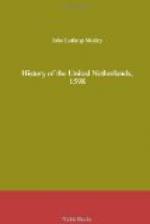Of this perfect despotism Philip was thus the sole administrator. Certainly he looked upon his mission with seriousness, and was industrious in performing his royal functions. But this earnestness and seriousness were, in truth, his darkest vices; for the most frivolous voluptuary that ever wore a crown would never have compassed a thousandth part of the evil which was Philip’s life-work. It was because he was a believer in himself, and in what he called his religion, that he was enabled to perpetrate such a long catalogue of crimes. When an humble malefactor is brought before an ordinary court of justice, it is not often, in any age or country, that he escapes the pillory or the gallows because, from his own point of view, his actions, instead of being criminal, have been commendable, and because the multitude and continuity of his offences prove him to have been sincere. And because anointed monarchs are amenable to no human tribunal, save to that terrible assize which the People, bursting its chain from time to time in the course of the ages, sets up for the trial of its oppressors, and which is called Revolution, it is the more important for the great interests of humanity that before the judgment-seat of History a crown should be no protection to its wearer. There is no plea to the jurisdiction of history, if history be true to itself.
As for the royal criminal called Philip II., his life is his arraignment, and these volumes will have been written in vain if a specification is now required.
Homicide such as was hardly ever compassed before by one human being was committed by Philip when in the famous edict of 1568 he sentenced every man, woman, and child in the Netherlands to death. That the whole of this population, three millions or more, were not positively destroyed was because no human energy could suffice to execute the diabolical decree. But Alva, toiling hard, accomplished much of this murderous work. By the aid of the “Council of Blood,” and of the sheriffs and executioners of the Holy Inquisition, he was able sometimes to put eight hundred human beings to death in a single week for the crimes of Protestantism or of opulence, and at the end of half a dozen years he could boast of having strangled, drowned, burned, or beheaded somewhat more than eighteen thousand of his fellow-creatures. These were some of the non-combatant victims; for of the tens of thousands who perished during his administration alone, in siege and battle, no statistical record has been preserved.




